Complete Solutions to CHEMISTRY of chapter JEE MAIN of Class 12 book with complete answers and questions
| Class 12 | CHEMISTRY |
| Chapter | JEE MAIN |
| JEE MAIN | CHEMISTRY |
| Number Of Questions | 100 |
| Academic Year | 2023-24 |
`E_(Cu^(2+)//Cu)^(@)=0.34V`
`E_(Cu^(+)//Cu)^(@)=0.522V`
`E_(Cu^(2+)//Cu^(+))^(@)=`06:12View SolutionThe number of orbitals associated with quantum numbers n =5, ` m _ s = + ( 1 ) /(2) ` is :
05:33View SolutionArrange the following in order of their `pK_(b)` value
(a)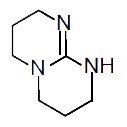 (b) `CH_(3)-NH-CH_(3)` (c) `H_(2)N-CH=NH` 07:38View Solution
(b) `CH_(3)-NH-CH_(3)` (c) `H_(2)N-CH=NH` 07:38View SolutionThe electron gain enthalpy ( in kJ//mol ) of fluorine, chlorine, bromine and iodine, respectively ,are :
07:36View SolutionA solution of m - chloroaniline, m- chlorophenol and m - chlorobenzoinc acid in ethyl acetate was extracted initially with a saturated solution of ` Na HCO _ 3 ` to give fraction A. The left over organic phase was extracted with dilute NaOH solution to give fraction B. The final organic layer was labelled as fraction C. Fractions A, B and C, contain respectively :
10:38View SolutionAtomic radius of Ag is similar to
02:12View SolutionWhich theory can explain bonding ` Ni ( CO ) _ 4 `
06:29View SolutionAmongst the following statements, that which was not proposed Dalton was :
04:11View SolutionConsider the following reactions :
(a) ` ( CH _ 3) _ 3 CCH ( OH ) CH_ 3 overset ( conc. H_ 2 SO _ 4) to `
(b) ` ( CH _ 3) _ 2CHCH (Br) CH _ 3 ( alc. KOH) to `
(c ) ` ( CH _ 3 ) _ 2 CH CH ( Br ) CH _ 3 ( (CH _ 3) _ 3 ) O^(Theta) K (o+)) to `
(d) `(CH _ 3) _ 2 underset(OH) underset(|) C - CH _ 2 - CHO overset ( Delta ) to `
Which of these reaction (s) will not produce Saytzeff product ?07:53View SolutionCorrect IUPAC name of ` [ Pt ( N H _ 3 ) _ 2 ) Cl ( CH _ 3 NH _ 2 ) ]Cl ` is :
06:12View SolutionIn zeolites & synthetic resin method which will be more efficient in removing permanent hardness of water :
04:21View SolutionConsider the following reaction :
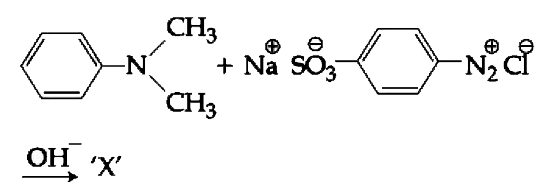
The product 'X' is used :05:48View SolutionThe dipole moments of `CCl _ 4, CHCl _ 3 and CH _ 4 ` are in the order :
03:52View Solution`1-"Methylethylene oxide" underset(HBr)overset("excess")to X,` Product 'X' will be-
03:11View Solution`"Hex-3-ynal" overset((1)NaBH_(4))to overset((2)PBr_(3))to overset((3)"Mg/Ether")to overset((4)CO_(2))to overset((5)H^(oplus))to(X)`, formed product X will be:
09:02View SolutionVapour pressure of pure ` CS _ 2 ` and ` CH _ 3 COCH _ 3 ` are 512 mm of Hg and 312 mm of Hg respectively. Total vapour pressure of mixture is 600 mm of Hg then find incorrect statement :
09:59View SolutionOxidation number of potassium in ` K _ 2 O`, ` K_2 O _ 2 and K O _ 2 ` , respectively, is :
04:47View SolutionThe relative strength of interionic / intermolecular forces in decreasing order is :
04:50View SolutionMatch the following :
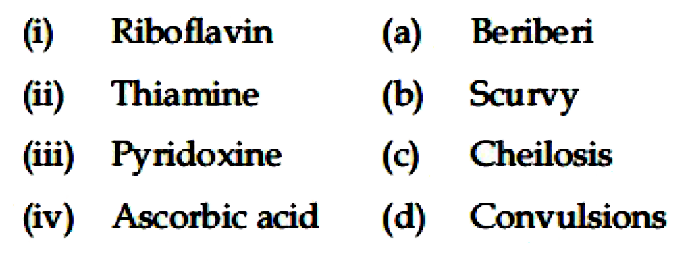 04:13View Solution
04:13View SolutionPurest form of commercial iron is :
01:38View SolutionNumber of chiral centers in chloramphenicol is :
03:25View SolutionEach of solution A and B of 100 L containing 4 g NaOH and 9.8 g H2SO4. Find pH of solution which is obtain by mixing 40 L solution of A and 10 L solution of B.
06:05View Solution` A _ ("(l)") to 2 B _ ( "(g)") `
` Delta U = 2. 1 ` kcal ,` Delta S = 20 ` Cal/k, T = 300 K.
Find ` Delta G ` ( in kcal )06:39View SolutionHalf life of 90Sr is 6.93 years. In a child body 1g of 90Sr dopped in place of calcium, how many years will it take to reduce its concentration by 90% (Assume no involvement of Sr in metabolism)
06:57View Solution`Cl _ 2 ` on reaction with hot & conc. NaOH gives two chlorine having products X and Y. On treatment with AgNO`""_3`, X gives precipitate. Determine average bond order of Cl and O bond in 'Y' ?
08:21View SolutionFor the reaction
`2H_(2)(g)+2NO(g) rarr N_(2)(g)+2H_(2)O(g)`
the observed rate expression is, rate `=k_(f)[NO]^(2)[H_(2)].` The rate experssion for the reverse reaction is :07:08View SolutionWhich of the following statements is correct ?
03:28View SolutionIdentify the correct labels of A, B and C in the following graph from the options given below:
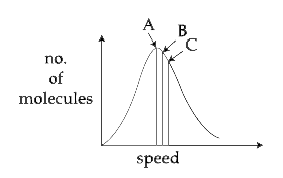
Root mean square speed `(V_("rms"),` most probable speed `(V_("mp")`, Average speed `(V_("av"))`06:46View SolutionBond order and magnetic nature of `CN^-` are respectively
04:34View SolutionNaOH (Hot + Conc.) + `Cl_2rarr A `+ other products and `Ca(OH)_2`(Cold and dilute) + `Cl_2 rarr B `+ other products . A and B are respectively:
04:46View SolutionWhich of the following statements are incorrect ?
(1) `Co^(+3)` with strong field ligand forms high magnetic moment complex.
(2) For `Co^(+3)` if pairing `"energy"(P) gt Delta_o` then the complex formed will have `(t_(2g)^(4),(e_g)^2)` configuration.
(3) For `[Co(en)^3]^( 3+) lambda_("absorbed")` is less than `lambda_("absorbed")` for `[CoF_6]^( 3–)`
(4) If `Delta_o = 18000 cm^(–1)` for `Co^(+3)` then with same ligands for it `Delta_t = 16000 cm^(–1)`10:34View SolutionAmongst the following which is a redox reaction ?
09:11View SolutionA chromatography column, packed with silica gel as stationary phase, was used to separate a mixture of compounds consisting of (A) benzanilide (B) aniline and (C) acetophenone. When the column is eluted with a mixture of solvents, hexane : ethyl acetate (20 : 80), the sequence of obtained compounds is
08:12View SolutionThe ammonia `(NH_(3))` released on quantitative reaction of 0.6 g urea `(NH_(2)CONH_(2))` with sodium hydroxide `(NaOH)` can be neutralized by :
10:16View SolutionAmong statements (a)-(d), the correct ones are :
(a) Decomposition of hydrogen peroxide gives dioxygen.
(b) Like hydrogen peroxide, compounds, such as `KClO_(3), Pb(NO_(3))_(2)` and `NaNO_(3)` when heated liberate dioxygen.
(c) 2-Ethylanthraquinol is useful for the industrial preparation of hydrogen peroxide.
(d) Hydrogen peroxide is used for the manufacture of sodium perborate.09:00View SolutionIn the following reaction sequence,
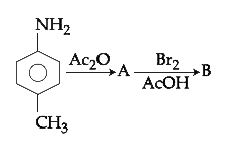
the major product B is :07:58View SolutionMetal with low melting point containing impurities of high melting point can be purified by
04:16View SolutionThe equation that is incorrect is :
06:03View SolutionFor the complex `[Ma_2B_2]` if M is `sp^3` or `dsp^2` hybridised respectively then total number of optical isomers are respectively:
03:16View SolutionIn the following reaction sequence, structures of A and B, respectively well be :
 05:21View Solution
05:21View SolutionThe correct order of stability for the following alkoxides is :
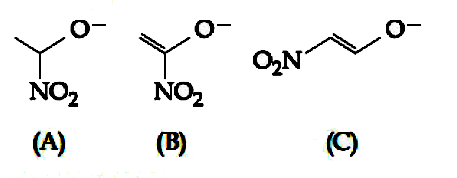 03:05View Solution
03:05View SolutionThere are two beakers (I) having pure volatile solvent and (II) having volatile solvent and non-volatile solute. If both beakers are placed together in a closed container then:
04:43View SolutionWhich of the following reactions are possible ?
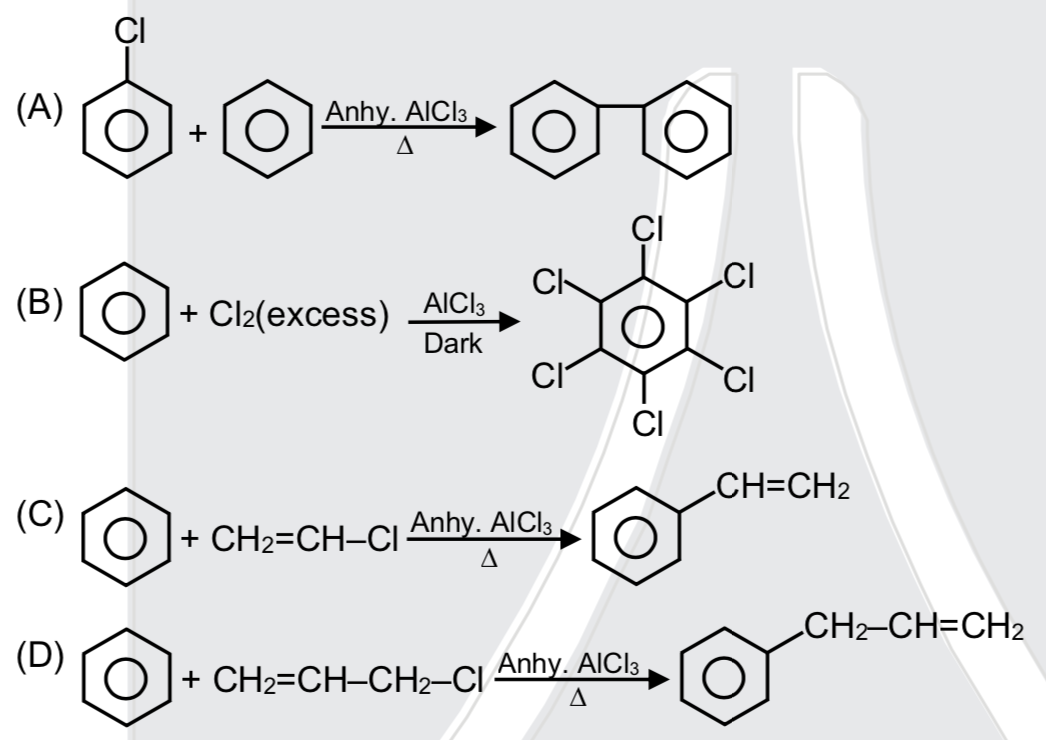 12:22View Solution
12:22View SolutionWhich one of the following amongs each pair will release maximum energy on gaining one electron (A = F, Cl), (B = S, Se), (C = Li, Na)
04:04View Solution3 gram of acetic acid is mixed in 250 mL of 0.1 M HCl. This mixture is now diluted to 500 mL. 20 mL of this solution is now taken is another container `1/2` mL of 5M NaOH is added to this. Find the pH of this solution. (`pK_a = 4.74`)
10:34View SolutionThe number of `sp^(2)` hybridised carbons present in ''Aspartame'' is _______.
04:06View SolutionConsider the following reactions :
`NaCl+K_(2)Cr_(2)O_(7)+underset("(Conc.)")(H_(2)SO_(4))rarr(A)+"side products"`
`(A)+NaOH rarr(B) +"Side products"`
`(B)+underset("(dilute)")(H_(2)SO_(4))+H_(2)O_(2)rarr(C)+"Side products"`
The sum of the total number of atoms in one molecule each of (A), (B) and (C) is _________.06:27View SolutionFlocculation value for `As_2S_3` sol by HCl is 30 m mole `L^( –1)` . Calcualte mass of `H_2SO_4` required in gram for 250 mL sol.
03:13View SolutionThe standard heat of formation `(Delta_(f)H_(298)^(0))` of ethane (in kJ/mol), if the heat of combustion of ethane, hydrogen and graphite are `-1560, -393.5` and `-286kJ/mol`, respectively is _______.
06:25View SolutionThe number oFIGURE bonds between sulphur and oxygen atoms is `S_(2)O_(8)^(2-)` and the number oFIGURE bonds between sulphur and sulphur atoms in rhombic sulphur, respectively, are:
03:48View SolutionFollowing vanderwaal forces are present in ethyl acetate liquid
03:17View SolutionArrange the order of `C--OH` bond length of the following compounds. (A) Methanol (B) Phenol (C) p-Ethoxyphenol
02:46View SolutionThe strength of an aqueous NaOH solution is most accurately determined by titrating: (Note: consider that an appropriate indicator is used)
07:39View SolutionThe major product of the followng reaction is:
 06:11View Solution
06:11View SolutionFor balmer series in the spectrum of atomic hydrogen the wave number of each line is given by `bar(V) = R[(1)/(n_(1)^(2))-(1)/(n_(2)^(2))]` where `R_(H)` is a constant and `n_(1)` and `n_(2)` are integers. Which of the following statements (s), is (are correct)
1. As wave length decreases the lines in the series converge
2. The integer `n_(1)` is equal to 2.
3. The ionisation energy of hydrogen can be calculated from the wave numbers of three lines.
4. The line of shortest wavelength corresponds to = 3.05:41View SolutionRate of a reaction increases by `10^6` times when a reaction is carried out in presence of enzyme catalyst at same temperature. Determine change in activation energy.
07:04View SolutionGypsum on heating at 393K produces
01:26View SolutionWhich of the following statement is not true for glucose?
04:22View SolutionThe third ionization enthalpy is minium for:
05:25View SolutionAccording to Hardy Schultz rule, correct order of flocculation value for `Fe(OH)_3` sol is :
04:19View SolutionCorrect order of first ionization energy of the following metals Na, Mg, Al, Si in `KJ mol^(–1)` respectively are:
04:56View SolutionThe decreasing order of reactivitly towards dehydrohalogenation `(E_(1))` reaction of the following compounds is:
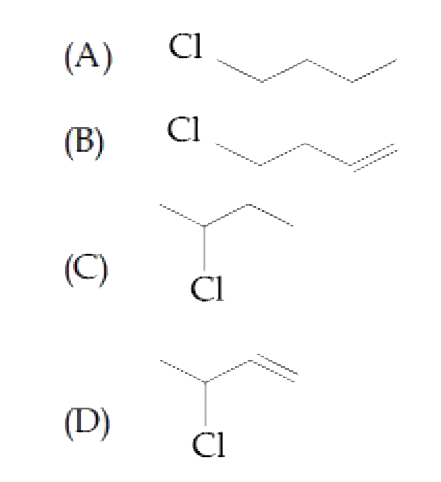 06:00View Solution
06:00View SolutionReagent used for the given conversion is
 : 03:19View Solution
: 03:19View SolutionAmong the gases (a)-(e) the gases that cause greenhouse eFIGUREFIGUREect are:
01:30View SolutionThe stoichiometre and solubility product oFIGURE a salt with the solubility curve given below is respectively.
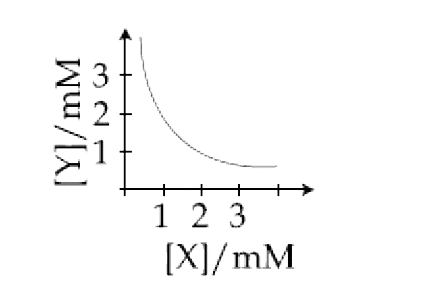 03:31View Solution
03:31View Solution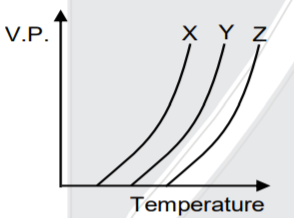 '
'
A. Intermolecular force of attraction of X gt Y
B. Intermolecular force of attraction of X lt Y
C. Intermolecular force of attraction of Z lt X.
Select the correct option(s).03:45View SolutionTwo liquids isohexane and 3-methylpentane has boiling point `60^@C` and `63^@C`. They can be separated by
06:22View SolutionThe complex that can show fac- and mer-isomers is
04:13View SolutionA gas undergoes expansion according to the following graph. Calculate work done by the gas
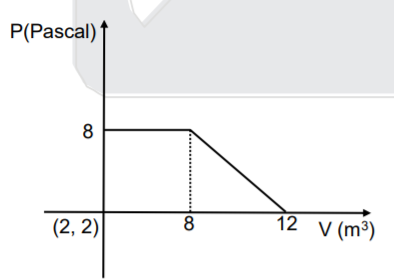 02:17View Solution
02:17View SolutionGiven `2H_(2)O rarr O_2 + 4H^+ + 4e^-` , `E_0 = -1.23 V`. Calculate electrode potential at pH = 5.
03:31View SolutionCalculated the mass of `FeSO_(4).7H_(2)O`, which must be added in 100 kg of wheat to get 10 PPM of Fe.
03:49View SolutionNumber of chiral centres in Pencillin is
03:14View Solution0.3 g `[ML_(6)]Cl_(3)` of molar mass 267.46 g/mol is reacted with 0.125 M `AgNO_3` (aq) solution, calculate volume of `AgNO_3` required in ml.
02:04View SolutionPreparation of Bakelite proceeds via reactions:
02:28View SolutionThe major product in the following reaction is :
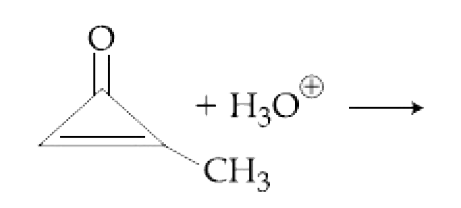 01:14View Solution
01:14View SolutionWhite phosphorus on reaction with concentrated NaOH solution in an inert atmosphere of `CO_(2)`, gives phosphine and compound (X). (X) on acidification with HCl gives compound (Y). The basicity of compound (Y) is:
03:14View SolutionKjeldahl method cannot be used for :
03:28View SolutionWhich of the following compounds is likely to show both Frenkel and Schottky defects in its cyrstalline form ?
01:42View SolutionArrange the following bonds according to their averge bond energies in descending order:
`C - Cl,C - Br ,C-F ,C-I`02:50View SolutionConsider the following plots of rate constant versus `(1)/(T)` for four different reactions. Which of the following orders is correct for the activation energies of these reactions ?
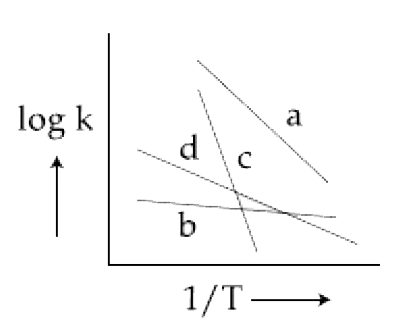 03:20View Solution
03:20View SolutionAssertion: pH of water increases on increasing temperature.
Reason: `H_(2)O rarr H^(+) + OH^(-)` is an exothermic process.06:30View SolutionHydrogen has three isotopes (A),(B) and (C). If the number of neutron(s) in (A), (B) and (C) respectivley, are (x) ,(Y) and (z), the sum of (x), (y) and (z) is
02:27View SolutionThe radius of the second Bohr orbit, in terms of the Bohar radius `a_(0)` in `Li^(2+)` is :
02:54View SolutionCorrect order of magnetic moment (spin only) for the following complexes `
(a) [Pd(PPh_(3))_(2)Cl_(2)]
(b) [Ni(CO)_(4)]
(c) [Ni(CN)_(4)]^(2-)
(d) [Ni(H_(2)O)_(6)]^(2+)`12:08View SolutionAssertion: It has been found that for hydrogenation reaction the catalytic activity increases from group5 to group-11 metals with maximum activity being shown by groups 7-9 elements of the periodic table. Reason: For 7-9 group elements adsorption rate is maximum.
04:57View SolutionThe major product [B] in the following seqyence of reaction is :
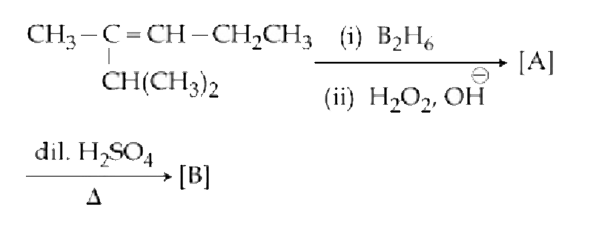 05:54View Solution
05:54View SolutionThere are two compounds A and B of molecular formula `C_(9)H_(18)O_(3)`. A has higher boiling point than B. What are the possible structures of A and B?
02:52View SolutionA metal (A) on heating in nitrogen gas given compound B.B on teratement with `H_(2)O` givens a colourless gas which when passed throught `CuSO_(4)` solution given a dark blue - violet coloured solution . A and B respectivley are :
03:49View SolutionTow monomers in maltose are :
02:36View SolutionWhich reaction does not occurs in the blast furnace in the metallurgy of Fe: `
a. CaO + SiO_2 rarr CaSiO_3
b. Fe_(2)O_(3) + CO rarr Fe_(3)O_(4) + CO_2
c. FeO + SiO_2 rarr FeSiO_3
d. FeO rarr (heat) Fe + 1/2 O_2`02:38View SolutionAmong (a) -(d) the complexes that can display geometical isomerism are :
(a) `[Pt(NH_(3))_(3)Cl]^(+)`
(b) `[Pt(NH_(3))Cl_(5)]^(-)`
(c) `[Pt (NH_(3))_(2)Cl(NO_(2))]`
(d) `[Pt(NH_(3))_(4)CIBr]^(2+)`06:10View SolutionThe increasing order of the atomic radii of the following elements is :
(a) C (b) O(c) F(d) ( e) Br01:46View SolutionHow many atoms lie in the same plane in the major product (C) ? (Where A is the alkyne of lowest molecular mass)
 05:18View Solution
05:18View SolutionComplex `[ML_(5)]` can exhibit trigonal bipyramidal and square pyramidal geometry. Determine total number of `180^@, 90^@ & 120^@` L-M-L bond angles.
03:48View SolutionAt constant volume 4 mol of an ideal gas when heated form 300k to 500k changes its internal energy by 500 J . The molar heat capacity at constant volume is ________.
02:28View Solution`NaClO_(3)` is used even is spacecrafts to produce `O_(2)` . The daily consumption fo pure `O_(2)` by a person is 492 L at atm , 300k .How much amount of `NaClO_(3)`, in grams is required to produce `O_(2)` for the daily consumption of a person at 1 atm 300K ?_________.
`NaClO_(3)(s) +Fe(s) to O_(2)(g) +NaCl_(s) +FeO(s)`
`R = 0.082L atm mol^(-) K^(-1)`05:44View SolutionGiven: `E_(Sn^(2+)//Sn) ^0 = -0.14V` , `E_(Pb^(2+)//Pb) ^0 = -0.13V`. Determine `[(Sn^(2+))//(Pb^(2+))]` at equilibrium. For cell reaction `Sn |Sn^(2+) || Pb^(2+) | Pb` , Take `(2.303RT)//F = 0.06V`
07:22View SolutionThe electronic configuration of bivalent Europium and trivalent cerium respectively is: (Atomic Number: Xe = 54, Ce = 58, Eu = 63)
03:00View SolutionIf the magnetic moment of a dioxygen species is 1.73 B.M, it may be:
04:29View SolutionThe major product (Y) in the following reactions is:
`CH_(3)-overset(CH_(3))overset(|)CH-C-=CH overset(HgSO_(4),H_(2)SO_(4))underset(H_(2)O)toX overset((i)C_(2)H_(5)MgBr,H_(2)O)underset((ii)"Conc",H_(2)SO_(4)//Delta)toY`11:47View Solution
CHEMISTRY questions and complete solutions for chapter JEE MAIN of JEE MAINS PREVIOUS YEAR ENGLISH of Class 12
